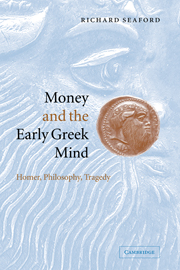Book contents
- Frontmatter
- Contents
- Preface
- List of abbreviations
- 1 Introduction
- PART ONE THE GENESIS OF COINED MONEY
- 2 Homeric Transactions
- 3 Sacrifice and distribution
- 4 Greece and the ancient Near East
- 5 Greek money
- 6 The preconditions of coinage
- 7 The earliest coinage
- 8 The features of money
- PART TWO THE MAKING OF METAPHYSICS
- References
- Index
7 - The earliest coinage
Published online by Cambridge University Press: 22 September 2009
- Frontmatter
- Contents
- Preface
- List of abbreviations
- 1 Introduction
- PART ONE THE GENESIS OF COINED MONEY
- 2 Homeric Transactions
- 3 Sacrifice and distribution
- 4 Greece and the ancient Near East
- 5 Greek money
- 6 The preconditions of coinage
- 7 The earliest coinage
- 8 The features of money
- PART TWO THE MAKING OF METAPHYSICS
- References
- Index
Summary
WHO INVENTED COINAGE?
Our conclusion that Greek coinage represents a synthesis of Near-Eastern and Greek practice now requires more precision. The influence of the ancient Near East on numerous elements of early Greek culture has long been recognised; and the exploration of this influence has in recent years accelerated (4b). It seems likely that, as in so many other areas, so too in the area of money the Greeks were influenced by their eastern neighbours, some of whom had been employing silver for various money uses since the third millennium bc (chapter 15). This is reflected in the Greek adoption of the Semitic word mna to refer to a weight (or unit of account) equal to one hundred drachmas or one sixtieth of a talent. The Mesopotamian manã is one sixtieth of a larger unit.
Balmuth has argued that coinage was not so much an invention as a development, consisting in the combination of two functions that had existed for centuries in the ancient Near East, the metal piece as a means of payment with the seal mark as a means of identification. Further, it seems that the Greeks themselves, in the earliest extant statements about the invention of coinage, attributed it not to themselves but to eastern neighbours, the Lydians. According to Pollux (9.83) Xenophanes of Colophon (sixth century bc) maintained that coinage was invented by the Lydians; and Herodotus (1.94) wrote that the Lydians ‘were the first, of men whom we know of, to have minted and used coinage of gold and silver’.
- Type
- Chapter
- Information
- Money and the Early Greek MindHomer, Philosophy, Tragedy, pp. 125 - 146Publisher: Cambridge University PressPrint publication year: 2004



